Related Research Articles

Hindi cinema, popularly known as Bollywood and formerly as Bombay cinema, refers to the film industry based in Mumbai, engaged in production of motion pictures in Hindi language. The popular term Bollywood is a portmanteau of "Bombay" and "Hollywood". The industry is a part of the larger Indian cinema, which also includes South Indian cinema and other smaller film industries.
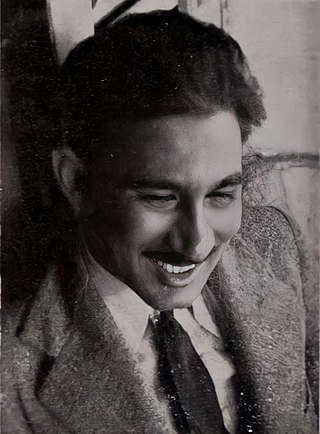
Khwaja Ahmad Abbas was an Indian film director, screenwriter, novelist, and journalist in Urdu, Hindi and English.

Raj Kapoor, also known as Ranbir Raj Kapoor, was an Indian actor, film director and producer, who worked in Hindi cinema. He is considered one of the greatest and most influential actors and filmmakers in the history of Indian cinema, and has been referred to as The Greatest Showman of Indian Cinema and as the Charlie Chaplin of Indian Cinema.

Nargis Dutt was an Indian actress and politician who worked in Hindi cinema. Regarded as one of the finest and greatest actresses in the history of Indian cinema, Nargis often portrayed sophisticated and independent women. Her work was in a range of genres, from screwball comedy to literary drama, and earned her various accolades.
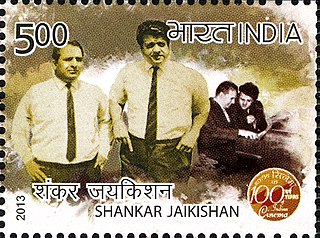
Shankar–Jaikishan, were an Indian composer duo of the Hindi film industry, working together from 1949 to 1971. They are widely considered to be one of the greatest ever music composers of the Hindi film industry.
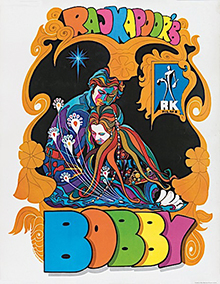
Bobby is a 1973 Indian Hindi-language musical romance film, produced and directed by Raj Kapoor, and written by Khwaja Ahmad Abbas. The film stars Raj Kapoor's son, Rishi Kapoor, in his first leading role, opposite Dimple Kapadia in her debut role. The film became a blockbuster, the top-grossing Indian hit of 1973, the second-top-grossing hit of the 1970s at the Indian box office, and one of the top 20 highest-grossing Indian films of all time. It also became an overseas blockbuster in the Soviet Union, where it drew an audience of 62.6 million viewers, making it one of the top 20 biggest box office hits of all time in the Soviet Union.

Awaara, also written Awāra and known overseas as The Vagabond, is a 1951 Indian Hindi crime drama film, produced and directed by Raj Kapoor, and written by Khwaja Ahmad Abbas. It stars Raj Kapoor along with his real-life father Prithviraj Kapoor, as well as Nargis, Leela Chitnis and K. N. Singh. Other members of the Kapoor family make an appearance, including Raj's youngest brother Shashi Kapoor, who plays the younger version of his character, and Prithiviraj's father Dewan Basheshwarnath Kapoor, playing a cameo in his only film appearance. The film's music was composed by Shankar Jaikishan.
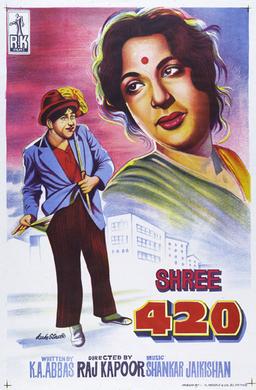
Shree 420 is a 1955 Indian Hindi comedy-drama film directed and produced by Raj Kapoor from a story written by Khwaja Ahmad Abbas whose use of Shree with the negative connotations of 420 caused controversy. The film stars Nargis, Nadira, and Kapoor. The number 420 refers to Section 420 of the Indian Penal Code, which prescribes the punishment for the offence of fraud; hence, "Mr. 420" is a derogatory term for a fraud. The film centers on Raj Kapoor, a poor but educated orphan who comes to Bombay with dreams of success. Kapoor's character is influenced by Charlie Chaplin's "little tramp", much like Kapoor's character in his 1951 Awaara. The music was composed by the team of Shankar Jaikishan, and the lyrics were penned by Shailendra and Hasrat Jaipuri.

Mera Naam Joker is a 1970 Indian romantic drama film, directed, edited and produced by Raj Kapoor under his banner R. K. Films, and written by Khwaja Ahmad Abbas. The film stars Raj Kapoor as the eponymous character, with his son Rishi Kapoor making his screen debut playing his younger version, along with Simi Garewal, Kseniya Ryabinkina, Padmini, Manoj Kumar and Dharmendra in supporting roles. The plot focuses on a clown who must make his audience laugh at the cost of his sorrows; three women who shaped his life view his final performance.
Shailendra Singh is an Indian playback singer and actor. He sang several Hindi and a few Marathi songs during the late 1970s and early 1980s.
"Mera Joota Hai Japani" is a Hindi song with music by Shankar Jaikishan and lyrics by Shailendra, written for the 1955 Bollywood film Shree 420. It was performed by popular Bollywood star Raj Kapoor, though actually sung by playback singer Mukesh.
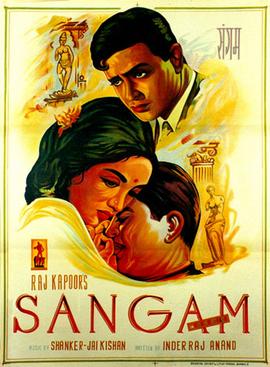
Sangam (transl. Confluence) is a 1964 Indian musical romantic drama directed, produced and edited by Raj Kapoor at R. K. Studios, written by Inder Raj Anand, and distributed by R. K. Films with Mehboob Studio and Filmistan. The film stars Kapoor, Vyjayanthimala and Rajendra Kumar in lead roles, with Iftekhar, Raj Mehra, Nana Palsikar, Lalita Pawar, Achala Sachdev and Hari Shivdasani in supporting roles. It tells the story of a pilot (Kapoor), who upon returning home from war after being assumed dead, weds the woman (Vyjayanthimala) he had long loved, unaware that she had been planning to marry his best friend (Kumar).
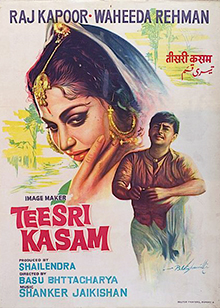
Teesri Kasam is a 1966 Hindi language drama film directed by Basu Bhattacharya and produced by lyricist Shailendra. It is based on the short story Mare Gaye Gulfam, by the Hindi novelist Phanishwarnath Renu. The film stars Raj Kapoor and Waheeda Rehman. The duo Shankar–Jaikishan composed the film's score. The film's cinematography was done by Subrata Mitra, dialogues were written by Phanishwarnath Renu and the screenplay is by Nabendu Ghosh.

Shailendra was a popular Indian Hindi-Urdu Poet, lyricist and film producer. Noted for his association with the filmmaker Raj Kapoor, singer Mukesh, and the composers Shankar–Jaikishan, he wrote lyrics for several successful Hindi film songs in the 1950s and the 1960s.

Hasrat Jaipuri, born Iqbal Hussain was an Indian poet, who wrote in the Hindi and Urdu languages. He was also a renowned film lyricist in Hindi films, where he won the Filmfare Awards for Best Lyricist twice – in 1966 and then in 1972.

Bawre Nain is a 1950 Indian Hindi-language romance film directed by Kidar Nath Sharma. It was produced under the Ambitious Pictures banner at Shree Sound Studios. For the music, Sharma persisted with music director Roshan, in spite of several demands from film distributors to have him removed following his failure as a composer in an earlier film, Neki Aur Badi (1949). The music became popular and is stated to be the reason for the film's success. One of the noteworthy songs that popularised playback singer Mukesh was "Teri Duniya Mein Dil Lagta Nahin", composed in Raga Darbari Kaanada. Bawre Nain is cited as Roshan's "first big hit" as a music composer.
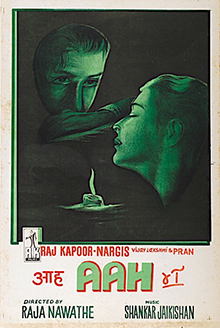
Aah is a 1953 black and white Hindi language romantic drama film starring Raj Kapoor and Nargis in lead roles. The film was produced by Raj Kapoor and directed by Raja Nawathe. This was Nawathe's first independent directorial venture. He had previously worked as assistant director to Raj Kapoor in Aag (1948), Barsaat (1949) and Awaara (1951).

This article contains a list of books about Hindi film director and actor Raj Kapoor.
HAVAS guruhi, meaning White Envy, is an Uzbekistani music group composed of seven members of the Ermatov family who are popularly known for singing Indian songs. The group was founded by a couple, Rustam and his wife Matluba, who are the director and producer of the group respectively. The singers and musicians of the band are their four children. The eldest child, a son named Khakhramon is the winner of Uzbekistan's Nihol award. The second child is a daughter named Shakhnoza. The third child is a son named Dostonbek. The fourth and youngest child is a daughter named Robiya. Nilufar, the wife of eldest son Khakhramon, is a former TV anchor and the present public relations officer of their band.
References
- 1 2 Linda Badley; R. Barton Palmer; Steven Jay Schneider (2006), Traditions in world cinema, Rutgers University Press, 2006, ISBN 978-0-8135-3874-7,
... To this day 'Awaara hoon' ('I'm a vagabond'), the title song of Raj Kapoor's Awaara ('The Vagabond', 1951) remains well known throughout Russia, which the director- star visited, and China, where both the song and film were said to be Chairman Mao's favourites ...
- ↑ Natasa Ďurovičová (31 August 2009), World cinemas, transnational perspectives, Taylor & Francis, 2010, ISBN 978-0-415-97653-4,
... hearing the hit theme song "Awaara Hoon" ("I am wayward") hummed on the streets of Nanjing. Then, traveling through a small town in a more remote part of China, Seth has to perform the song on request at a local gathering: 'No sooner have I begun than I find that the musicians have struck up the accompaniment behind me: they know the tune better than I do ...
- ↑ "This Chinese man singing Raj Kapoor's Awara Hoon will light up your day". India Today . 23 March 2018. Retrieved 18 July 2020.
The song was written in Urdu and immediately became a favourite of many people around the globe.
- ↑ Ashraf Aziz (2003), Light of the universe: essays on Hindustani film music, Three Essays Collective, 2003, ISBN 978-81-88789-07-8,
... Its title song Awaara hoon, written by Shailendra, remains the best-appreciated Hindustani film song in foreign countries ...
- ↑ Bhaskar Sarkar (20 May 2009), Mourning the nation: Indian cinema in the wake of Partition, Duke University Press, 2009, ISBN 978-0-8223-4411-7,
... When Raj sings cheerfully about the pleasures of being a street-smart vagabond ("Awaara Hoon"), he strikes a chord in audiences from various classes and backgrounds all over India and beyond: in China, in the Soviet Union, in the Middle East ...
- ↑ "100 Greatest Bollywood Songs of All Time"
- ↑ Tejaswini Ganti (25 June 2004), Bollywood: a guidebook to popular Hindi cinema, Psychology Press, 2004, ISBN 978-0-415-28853-8,
... Their title track for Awaara, "Awaara Hoon" (I'ma vagabond) was immensely popular world-wide, leading to local versions of the song in Greece, the Middle East, the Soviet Union, and China ...